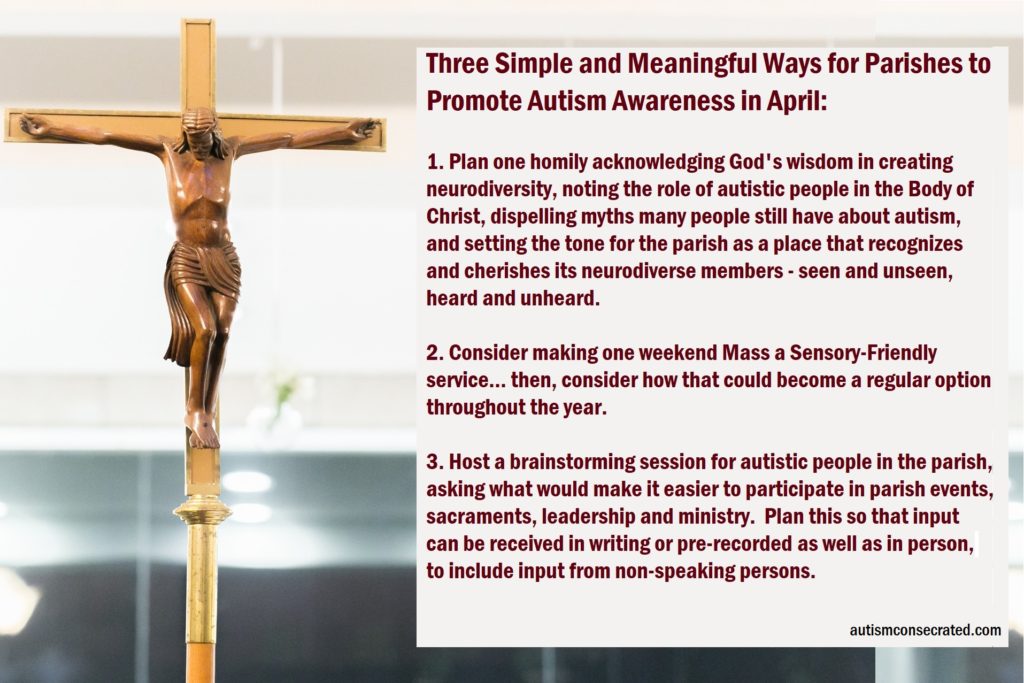Prayers for World Autism Day 2024
In recognition of World Autism Day 2024, we are pleased to offer a Short Form of our Prayer Petitions for Autism’s Belonging in the Body of Christ. The Short Form is, like the full list, free to download, print, copy and share for any use, individually or in groups, including adaptation for Prayers of the Faithful at daily or weekly Mass. Likewise, this post may also be shared freely, that people in communities far and wide may join with us in prayer!
Download Page for short form: https://autismconsecrated.com/prayers-for-autism-belonging-short-form/
Download Page for full list: https://autismconsecrated.com/autism-consecrated-prayer-intentions-any-dates-2/
The short form is as follows.
Prayers For Autism’s Belonging in the Body of Christ
Heavenly Father, we offer these prayers to You, that we may humbly recognize where we stand, and where we fall short, in supporting the autistic community. We ask You to give us the grace of healing and reconciliation where wounds and division exist.
May we:
- Realize, and counteract, language and attitudes which stigmatize and pathologize autism
- See autistic social, emotional, and cognitive processing as equal in dignity to neurotypical processing
- Design our space such that autistic people are not expected to mask, suppress or replace neurodivergent traits
- Grow in empathy toward the experiences of autistic individuals
- Embrace a spirit of humility, repentance and curiosity as we acknowledge where we still lack understanding and comprehension of the autistic experience, including:
- Communication (including non-spoken communication)
- Sensory processing and overload
- Emotional processing, alexithymia, and hyperempathy
- Information processing and overload
- Performance pressure, social rejection, and exclusion
- Hidden co-occurring conditions such as dyspraxia, dysautonomia, joint hypermobility, migraine, food sensitivity
- Appreciate the presence of autistic members of the community, realizing that it is not possible to know if someone is or is not autistic by assumption, and that autism is present in all age groups
- Ponder how many neurodivergent people in our community cannot be present because of a lack of support, and how we can extend to them the chance to authentically belong
- Strive to make our community accessible, welcoming, and accepting to neurodivergent people
- See the obstacles which prevent or impede neurodivergent people from being present in our community
- Invite neurodivergent people in our community to lead, rather than be led; teach, rather than be taught; explain things to us, rather than be told how things are
- Promote a culture of neurodiversity
- Look to autistic members of the community for guidance and suggestions on how to support and maintain accessibility and regular participation by neurodivergent individuals
- Outwardly demonstrate how striving to make our community more accessible to autistic members benefits everyone
May we seek forgiveness for the times we have:
- Perpetuated inaccurate and unhelpful stereotypes
- Allowed fear and pride to limit our generosity, creativity, and hospitality
- Cited scarcity of resources in upholding the status quo
- Relied on numbers to justify or deny accommodations, rather than upholding the value of the individual
- Made assumptions or decisions for autistic individuals without their input
- Failed to believe an autistic person’s experience
- Turned an autistic person away from our community for being autistic
- Lectured an autistic person about the unsuitability or inconvenience of their needs
- Failed to include, invite, or respond to autistic individuals in community activities
- Passed over an autistic person for volunteer or leadership positions, for the sake of their autism
- Cast autistic traits as character flaws
- Allowed convenience, popular opinion, fear, or jealousy to influence how we respond to requests for accommodations and accessibility
- Required autistic individuals to suppress, mask, or eliminate neurodivergent traits in order to participate or belong
We ask this all in Jesus’ Name: Lord, hear our prayer!
AMEN.
Thank you for praying with us!






